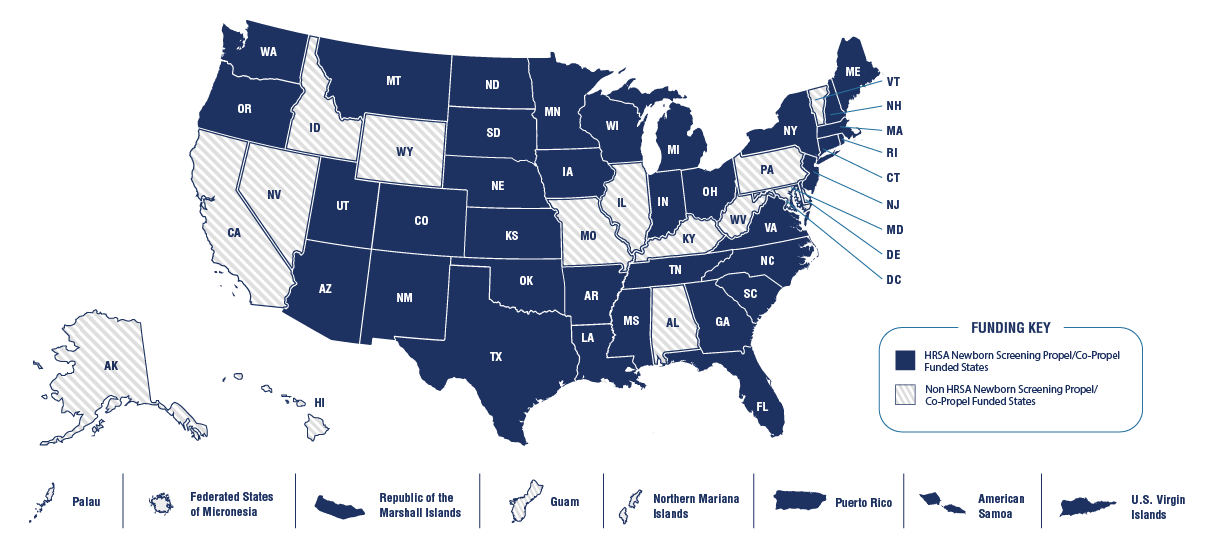States and territories across the United States have newborn screening (NBS) programs. The NBS Propel program helps states and U.S.-affiliated jurisdictions strengthen newborn screening programs. This program responds to the needs that states have expressed to us. Specifically, they have asked for help with:
- Adding new Recommended Uniform Screening Panel (RUSP) conditions to their screening programs
- Improving the quality of their system
- Ensuring long-term follow up of children with conditions
Awards
HRSA awarded $9.3 million in 2023 to 28 states.
Read the closed funding opportunity notice (HRSA-23-065) for details.
Our reach
This 2023 funding reached newborn screening programs in 25 states and 3 U.S.-affiliated jurisdictions.
In 2024, through the Cooperative Newborn Screening System Priorities (NBS Co-Propel) Program, we now reach 35 states and 4 U.S.-affiliated jurisdictions.
Newborn Screening Propel and Co-Propel Program Reach

Map description
Map of the United States showing HRSA Newborn Screening Propel and Co-Propel program reach.
HRSA Newborn Screening Propel/Co-Propel funded states/territories: American Samoa, Arizona, Arkansas, Colorado, Connecticut, Florida, Georgia, Indiana, Iowa, Kansas, Louisiana, Mane, Massachusetts, Michigan, Minnesota, Mississippi, Montana, Nebraska, New Hampshire, New Jersey, New Mexico, New York, North Carolina, North Dakota, Ohio, Oklahoma, Oregon, Puerto Rico, Republic of the Marshall Islands, Rhode Island, South Carolina, South Dakota, Tennessee, Texas, Utah, U.S. Virgin Islands, Virginia, Washington, and Wisconsin.
Non HRSA Newborn Screening Propel/Co-Propel funded states/territories: Alabama, Alaska, California, Delaware, District of Colombia, Federated States of Micronesia, Guam, Hawaii, Idaho, Illinois, Kentucky, Maryland, Missouri, Nevada, Northern Mariana Islands, Palau, Pennsylvania, Vermont, West Virginia, and Wyoming.
How the NBS Propel program works
Newborn screening systems are complex, and each state faces unique challenges. Our funding helps states prioritize changes, fix gaps, and make sure their newborn screening programs operate effectively. The program helps states and U.S.-affiliated jurisdictions by:
Adopting newly added Recommended Uniform Screening Panel (RUSP) conditions
The RUSP is a national guideline for NBS. It includes a list of conditions for which the Secretary of the Department of Health and Human Services recommends all newborns receive screening.
Adding new conditions to state screening programs can be challenging. It requires:
- Approval from state legislatures or advisory boards
- Additional funding
- More personnel
- Expanded education of hospital, midwife, clinic, and specialist staff
- Upgraded screening equipment
- Maintenance of the existing screening process while adding a new condition
Improving the quality of the screening process
The screening process involves collecting samples, testing, and follow-up. Our program helps states create standards for timely diagnosis, treatment, and referrals. This ensures a thorough and reliable screening process and leads to better health outcomes for newborns.
Expanding access to diagnosis and treatment options
While screening checks for a condition, diagnostic testing confirms if the baby has the condition. Some conditions are complex and require specialized care. Our program educates and provides resources about diagnosis and treatment options to providers and families.
We aim to help underserved populations and ensure equitable access to care. For example, telehealth can help reach areas that lack specialized providers.
Building long-term, follow-up capacity
After diagnostic testing, it is crucial to support children with conditions and their families throughout their child’s life.
Our program:
- Supports long-term, follow-up care for children with conditions, such as Severe Combined Immunodeficiency (SCID) and other conditions found through newborn screening
- Links public health agencies with clinicians to ensure continuous care and support
SCID and other NBS conditions
SCID is a group of genetic conditions in which a baby is born with a nonworking or poorly working immune system.
SCID was added to the RUSP in 2010. Today, 53 U.S. NBS programs offer SCID screening.
SCID and other conditions listed on the RUSP are often life-threatening in infancy unless found early in life and treated.
In support of the Blueprint for Change
Newborn screening programs are vital for improving the health of babies and children.
Together with the NBS Co-Propel program, this work supports the national Blueprint for Change for Children and Youth with Special Health Care Needs. This program fills critical gaps and makes state programs more effective. This way, every family can get what their child needs so that they can play, go to school, and grow up to become a healthy adult.
More information
News & events
Stay up-to-date with MCHB: sign up for newsletters.
Jobs
Find open positions with HRSA.
Contact us
Need more information, or have a specific question about this program? Contact us at NBSprograms@hrsa.gov.
Want to understand more about newborn screening? Visit the Newborn Screening Information Center for information on health conditions, the process, and your state’s program.